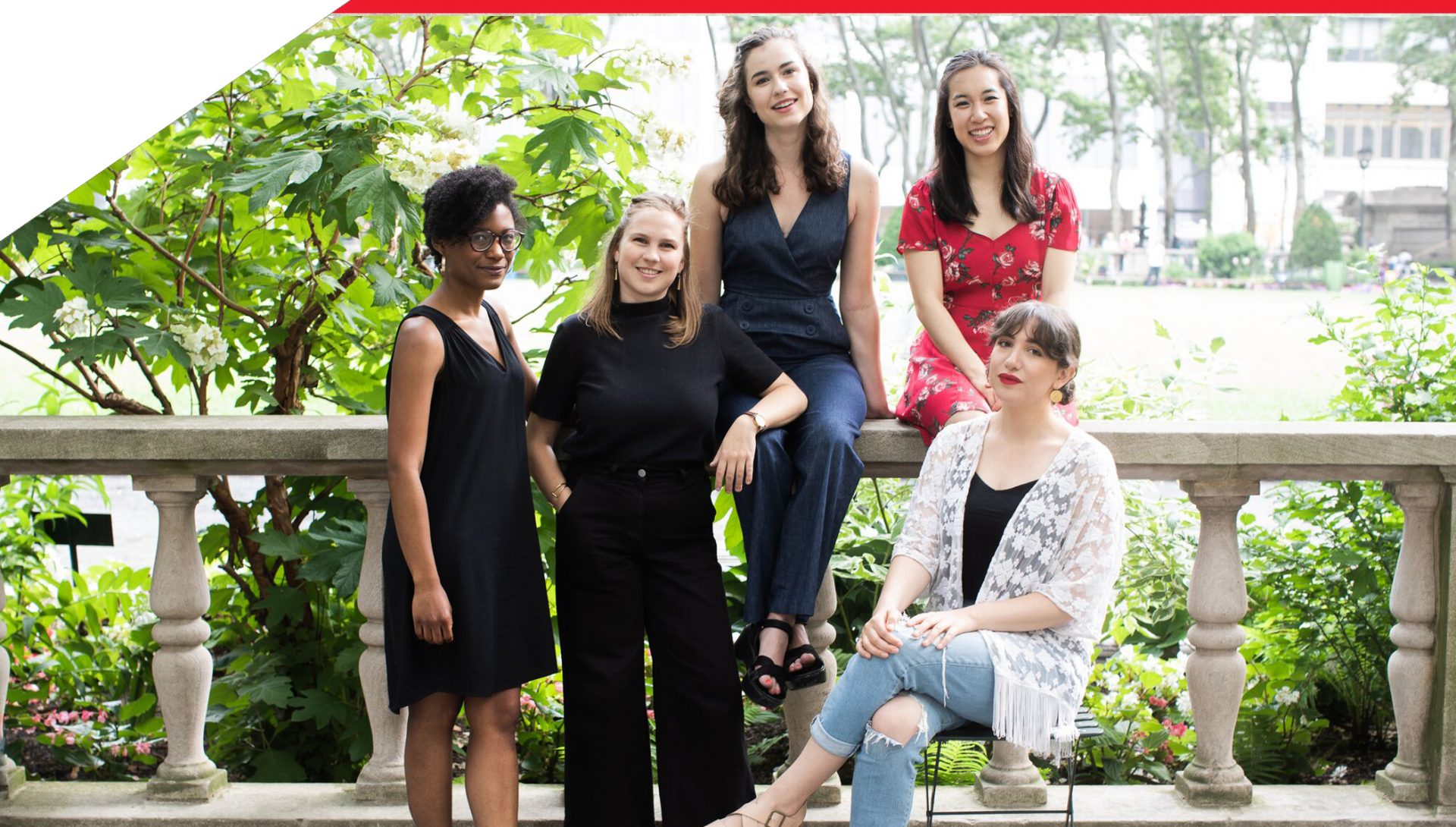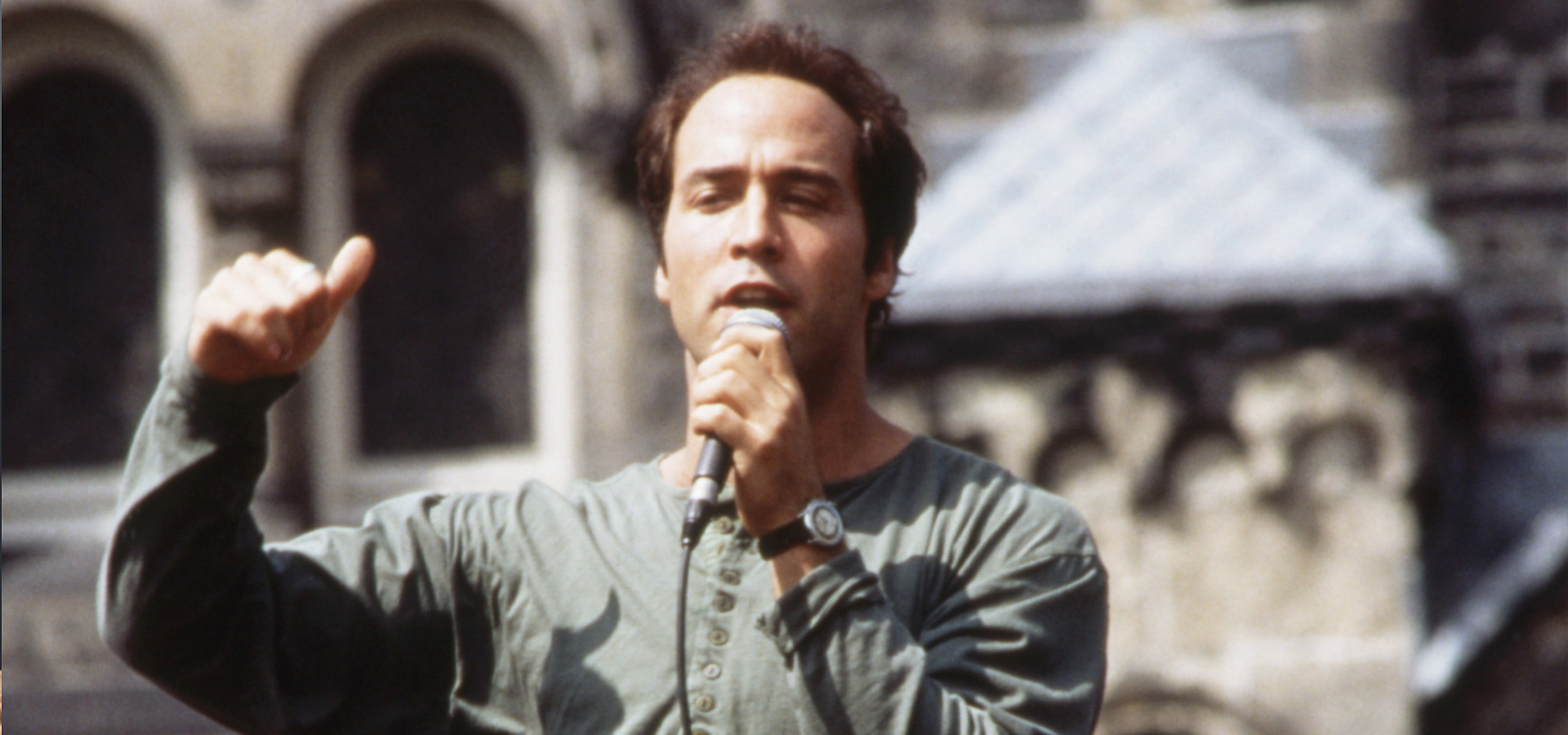On Solid Common Ground

A cosmic creative alumni collaboration makes a beautiful musical together: Director Tyler Thomas, choreographer Nora Thompson ’15, composer Cassie Willson ’17, producer Cynthia Tong ’14, writer Carly Feinman ’16. (Photo by Hayim Heron.)
The musical If Sand Were Stone premiered this summer at the New York Musical Festival, and offers an atypical subject in a genre noted for cheery songs and happy endings. It’s about a woman with Alzheimer’s and her familial relationships.
But talk with the creative duo behind the production, writer Carly Feinman ’16 and composer Cassie Willson ’17, and you’ll hear the full backstory, something Rodgers and Hammerstein might have cooked up: lucky coincidences, magic connections, hard work, determination, and success.
At Wesleyan, Feinman was an English major and Willson a music major. Their paths had not crossed until each signed up for a course with Professor Quiara Hudes on songwriting, in which Hudes would pair a lyricist with a composer and send them off to create. The Feinman/Willson pairing was the second-to-last of the semester.
“It was cosmic alignment,” recalls Willson. “We went into a practice room, the two of us and a piano …”
“And immediately we wrote the song,” says Feinman. “It was collaboration at its most true—it felt easy and exciting.”
“A part of that first song actually ended up as the opening number,” adds Willson.
Reached via phone this fall, the two produce a conversation like a braid, ideas overlapping and flowing together.
“I had never thought about writing for theater,” says Willson, “but a lot of Carly’s plays were about time, revisiting memories. That theme was our common ground.”
“Once we realized that, Cassie offered up this amazing nugget: her maternal grandmother had passed away from early-onset Alzheimer’s disease.”
“She was the mystical matriarch,” says Willson. “I carry her with me as a grounding thought: Connie’s my grandmother; I can do anything.”
“We started writing,” Feinman says, “with this story as our central truth.”
Once both were graduates living in New York City, they continued their project through personal outreach into many others living with Alzheimer’s. Offering musical theater workshops to patients at a nearby care facility helped them both learn about the disease, as well as give back.
“Music and dancing reached the residents on a deep level,” recalls Feinman. “And that’s why Cassie’s music is integral to our work. It’s an important way to tell the story.”
Movement was also key, so they invited Nora Thompson ’15 into the collaboration. “We’re telling a story about Alzheimer’s. Language goes quickly, so movement is going to be vital. Do you want to work with us?” Feinman messaged her on Facebook.
Thompson did. A Science in Society and dance major at Wesleyan, she too had a grandmother who had suffered from Alzheimer’s. She joined them at workshops and picked up key movements for her dances by observing repetitive gestures and the way patients held their bodies as they sat in their chairs.
“I don’t often work with narrative in my own choreography,” notes Thompson. “So I particularly enjoyed one little blip in the production where I was freed from storytelling to capture the energy that Billie, the main character, is experiencing. Another favorite part was the song, ‘Feels Like,’ with a really crazy, interesting harmony. It left a lot space for me to make something super abstract.”
After two years of intense work—while pursuing their fulltime jobs—Willson and Feinman decided to apply for the New York Musical Festival.
“We weren’t expecting much. People had told us we’d be lucky to get in on our fourth try,” recalls Willson. “The day we got it, Carly called me sobbing. I couldn’t stop saying ‘Oh my God.’”
“Then we both hung up and called our families. About an hour later, we called each other back and said, ‘Okay, what do we have to do?’” Feinman recalls.
“Then the panic set in—and then it was replaced by excitement and ambition,” says Willson
“That entire period before production was an emotional pendulum,” recalls Feinman. “But we saw the challenge, made an action plan, and got it done. Our producer, Cynthia Tong ’14—I can’t say her name enough times!—figured out all the things none of us knew how to do.”
Thompson was the one who enlisted Tong, also a dancer at Wesleyan, asking if she’d be interested in helping to manage the production. It so happened that Tong had been missing her Wesleyan arts experiences and agreed to consider it.
“I met with Carly, and Cassie, and Nora, and the director, Tyler Thomas, and they told me they’d be comfortable giving me the title of producer if I could help with a few things—schedules, keeping things on track, fundraising,’” Tong recalls. “I said sure, but I didn’t know how much time I really had.” Like the others, she was quickly immersed.
If Sand Were Stone opened July 18 at the Acorn Theater and played through July 22, garnering praise from The New York Times, which called it a “strong offering,” with Thompson’s “spare yet essential choreography,” and concluding that “part of this musical’s triumph is its sensitivity and grace.”
Willson calls this media response “a happy surprise,” but it’s really audience reactions that touched the team.
“I can’t tell you how many emails both Cassie and I received after its run, from people we’d never even met,” says Feinman.
“They were saying, ‘Thank you; this story is so truthful to my experience.’”
“That’s what we were really after, and it was hugely important to us.”
Asked if there is another opportunity to catch the show soon, Feinman and Willson demur.
“If Sand Were Stone is actively in revision,” says Willson. “We’re so proud of what we did, but we have no intention of putting up that same show again.”
“At the most basic, the next step is for Cassie and me to get into a room, with a piano,” says Feinman. “That’s the part that we both enjoy, the writing together.”
“Theater is such a collaborative medium,” adds Willson, “and you have to surround yourself with people who know what they’re doing, and are good to work with. We were so lucky to have this amazing team around us.”
**
If Sand Were Stone, excerpt from the New York Musical Festival show.
In this duet in If Sand Were Stone, the main character and mother Billie (Trish Lindström), who is suffering from Alzheimer’s, and her college-age daughter, Margaux (Alexis Floyd), recall Margaux’s childhood in an emotional moment. Book and lyrics by Carly Brooke Feinman and music by Cassie Willson, choreography by Nora Thompson. Cynthia Tong ’14 produced the show. This video excerpt from If Sand Were Stone, by appeared at the New York Musical Festival last summer, in 2018. It is filmed by Ryan Malyar at Orpheum Video.
The title of the play, explains Feinman, comes from a quote by Jorge Luis Borges: “Nothing is built on stone; all is built on sand, but we must build as if the sand were stone.” Calling it “one of the fundamental quotes I live my life by,” she say, “Nothing is permanent, but what other choice do we have, except to build as if it is?”
The duo also adopted Vincent Van Gogh’s “I am always doing that which I cannot do, in order that I may learn how to do it.” as their guiding premise in this collaboration.
“Did we know how to write a musical? Oh, hell, no. No. We didn’t. Of course not, but did we learn while we were doing it? Yes,” says Feinman
“We learned from each other,” says Willson, “and by listening, and by watching our favorite shows. You really do figure it out along the way.”
Says choreographer Nora Thompson ’15, It was good to be working with people who I trusted even though I hadn’t known them that well at Wesleyan. That trust proved to be really important throughout the whole experience.”
For more information and to follow other team projects, see carlybrookefeinman.com.

